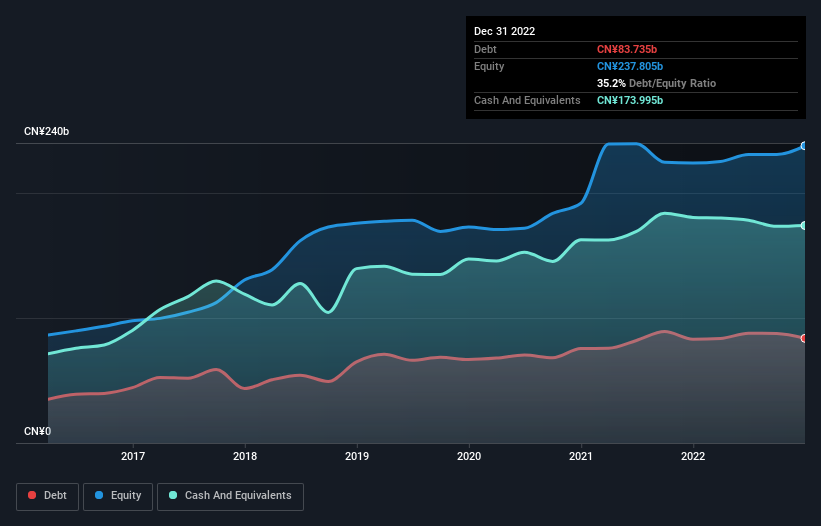- United States
- /
- Interactive Media and Services
- /
- NasdaqGS:BIDU
We Think Baidu (NASDAQ:BIDU) Can Manage Its Debt With Ease

Legendary fund manager Li Lu (who Charlie Munger backed) once said, 'The biggest investment risk is not the volatility of prices, but whether you will suffer a permanent loss of capital.' So it seems the smart money knows that debt - which is usually involved in bankruptcies - is a very important factor, when you assess how risky a company is. We can see that Baidu, Inc. (NASDAQ:BIDU) does use debt in its business. But is this debt a concern to shareholders?
What Risk Does Debt Bring?
Debt assists a business until the business has trouble paying it off, either with new capital or with free cash flow. Part and parcel of capitalism is the process of 'creative destruction' where failed businesses are mercilessly liquidated by their bankers. However, a more common (but still painful) scenario is that it has to raise new equity capital at a low price, thus permanently diluting shareholders. By replacing dilution, though, debt can be an extremely good tool for businesses that need capital to invest in growth at high rates of return. When we think about a company's use of debt, we first look at cash and debt together.
See our latest analysis for Baidu
What Is Baidu's Net Debt?
As you can see below, Baidu had CN¥83.7b of debt, at December 2022, which is about the same as the year before. You can click the chart for greater detail. But on the other hand it also has CN¥174.0b in cash, leading to a CN¥90.3b net cash position.

A Look At Baidu's Liabilities
Zooming in on the latest balance sheet data, we can see that Baidu had liabilities of CN¥79.6b due within 12 months and liabilities of CN¥73.5b due beyond that. Offsetting these obligations, it had cash of CN¥174.0b as well as receivables valued at CN¥17.2b due within 12 months. So it can boast CN¥38.0b more liquid assets than total liabilities.
This short term liquidity is a sign that Baidu could probably pay off its debt with ease, as its balance sheet is far from stretched. Succinctly put, Baidu boasts net cash, so it's fair to say it does not have a heavy debt load!
In addition to that, we're happy to report that Baidu has boosted its EBIT by 49%, thus reducing the spectre of future debt repayments. The balance sheet is clearly the area to focus on when you are analysing debt. But ultimately the future profitability of the business will decide if Baidu can strengthen its balance sheet over time. So if you want to see what the professionals think, you might find this free report on analyst profit forecasts to be interesting.
Finally, a company can only pay off debt with cold hard cash, not accounting profits. Baidu may have net cash on the balance sheet, but it is still interesting to look at how well the business converts its earnings before interest and tax (EBIT) to free cash flow, because that will influence both its need for, and its capacity to manage debt. Over the last three years, Baidu actually produced more free cash flow than EBIT. There's nothing better than incoming cash when it comes to staying in your lenders' good graces.
Summing Up
While it is always sensible to investigate a company's debt, in this case Baidu has CN¥90.3b in net cash and a decent-looking balance sheet. The cherry on top was that in converted 108% of that EBIT to free cash flow, bringing in CN¥18b. So is Baidu's debt a risk? It doesn't seem so to us. When analysing debt levels, the balance sheet is the obvious place to start. But ultimately, every company can contain risks that exist outside of the balance sheet. We've identified 1 warning sign with Baidu , and understanding them should be part of your investment process.
If, after all that, you're more interested in a fast growing company with a rock-solid balance sheet, then check out our list of net cash growth stocks without delay.
Valuation is complex, but we're here to simplify it.
Discover if Baidu might be undervalued or overvalued with our detailed analysis, featuring fair value estimates, potential risks, dividends, insider trades, and its financial condition.
Access Free AnalysisHave feedback on this article? Concerned about the content? Get in touch with us directly. Alternatively, email editorial-team (at) simplywallst.com.
This article by Simply Wall St is general in nature. We provide commentary based on historical data and analyst forecasts only using an unbiased methodology and our articles are not intended to be financial advice. It does not constitute a recommendation to buy or sell any stock, and does not take account of your objectives, or your financial situation. We aim to bring you long-term focused analysis driven by fundamental data. Note that our analysis may not factor in the latest price-sensitive company announcements or qualitative material. Simply Wall St has no position in any stocks mentioned.
About NasdaqGS:BIDU
Baidu
Provides online marketing and cloud services through an internet platform in the People’s Republic of China.
Flawless balance sheet and undervalued.


